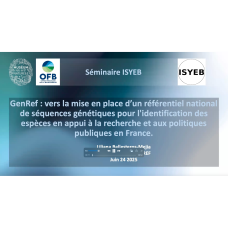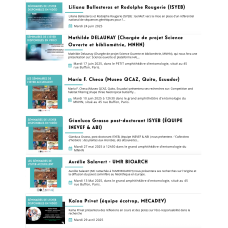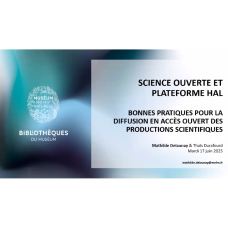Christophe DIAGNE, Chercheur IRD, Centre de Biologie pour la Gestion des Populations (CBGP)

bandeau ISYEB

bandeau ISYEB
Christophe DIAGNE, Chercheur IRD, Centre de Biologie pour la Gestion des Populations (CBGP), Montferrier sur Lez, France
nous présentera ces travaux portant sur le coût économique des invasions biologiques.
Biological invasions are responsible for substantial economic, sanitary and ecological impacts worldwide. Efficiently mitigating this pervasive driver of global change requires the improvement of public awareness and policy regarding its substantial impacts on our socio- ecosystems. One valuable option to contribute to this objective is to inform the society on the economic costs linked to these impacts. However, a clear and standardized overview of the economic costs of biological invasions was lacking until the recent advent of the InvaCost database. My talk will organised in three parts. First, I introduce InvaCost, the first comprehensive, updatable and harmonized compilation of the economic costs associated with biological invasions worldwide. I present the methodology and tools used to build and populate this living and publicly available database, as well as ways and avenues for further improving it. Second, I highlight the main outcomes from the first global analysis of this database. Among the findings, we showed that the reported costs of invasions reached a minimum of US$1.288 trillion (2017 US dollars) over the past few decades, and that these costs remain strongly underestimated and do not show any sign of slowing down – calling for the implementation of consistent management actions and international policy agreements to limit the harm of invasions. Third, I present insights, projects and perspectives from our international workshop that brought together multidisciplinary expertise to investigate this data resource. We have now launched several dozens of projects that aim at fully understanding the multiple dimensions of the economic costs of biological invasions across regions, taxa, and sectors throughout the world. Ultimately, this comprehensive assessment of the economic costs of invasions worldwide contributes to provide a strong foundation for effective management approaches and optimising legislation at the interface between science and society.
Quelques références associées :
La présentation se fera sur Teams
Avec notamment pour cette saison :
Peer Community In: A free alternative to evaluate, validate (and publish?) preprints, Denis Bourguet, Thomas Guillemaud et Marjolaine Hamelin, Inrae-CNRS-Université Côte d’Azur, Sophia Antipolis, France.
Spectroscopy insights into intracellular amorphous calcium carbonate (ACC) formed by cyanobacteria, Neha MEHTA, IMPMC, Paris, France
Genomic architecture and the evolutionary pathways to viral domestication in ichneumonid parasitic wasps, Bernardo FERREIRA DOS SANTOS, Institut de Systématique, Evolution, Biodiversité, Paris, France
Evolution and biogeography in Parablechnum (Blechnaceae): recent advances and upcoming challenges, Sonia Molino, Universidad Complutense de Madrid, Spain [Synthesys+]
Bref panorama subjectif de l’histoire et des techniques du dessin scientifique au MNHN, Didier Geffard-Kuriyama, Atelier d’Iconographie Scientifique, MNHN, France
Behavior is a motor and brake for evolution Martha Muñoz,Department of Ecology and Evolutionary Biology at Yale University, USA
Des gènes aux traits fonctionnels dans l’océan global Emile Faure, Université de Bretagne Occidentale, France
Rare zirconium-niobium silicates of the Alfred Lacroix collections: results and possibilities Natale Perchiazzi, University of Pisa, Italy [Synthesys+]
Les ports maritimes : enjeux écologiques de l’urbanisation littorale Christophe Lejeusne, Aix-Marseille Université, IMBE, Station Marine d’Endoume, France
Optimal alignment of Potts models Hugo Talibart, Atelier de BioInformatique, Institut de Systématique, Evolution, Biodiversité, Paris, France
Flashy Plants Attract More Scientists Martino Adamo, Department of Life Sciences and Systems Biology, University of Torino, Italy



